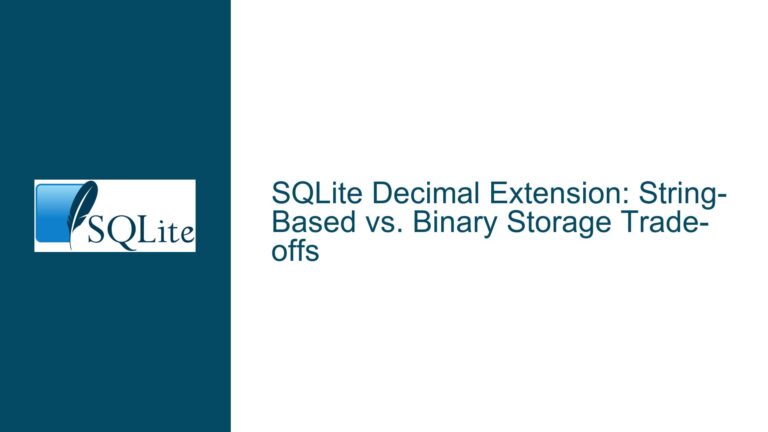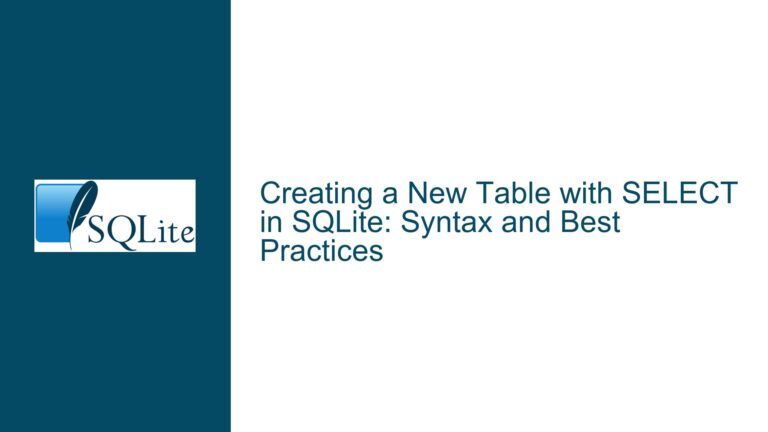Storing Crypto Prices in SQLite: Floating Points vs. Alternatives
Issue Overview: Storing Crypto Prices with Precision and Efficiency
Storing cryptocurrency prices in a database like SQLite presents a unique challenge due to the extreme range of values that crypto prices can take. Prices can range from fractions of a cent (e.g., $0.0000000001531) to millions of dollars (e.g., $1,000,000.01). The primary concern is maintaining sufficient precision while ensuring efficient storage and retrieval. The user in the discussion is considering several options, including using floating-point numbers with rounding, integers with custom exponents, strings, and even theoretical solutions like IEE754 decimals. Each approach has its trade-offs in terms of precision, storage efficiency, and computational overhead.
The user’s inclination towards using floating-point numbers with rounding to significant figures is a pragmatic approach, but it raises concerns about the potential for floating-point arithmetic errors and the necessity of consistent rounding after every operation. The discussion also highlights the importance of considering regulatory and legal requirements, especially when dealing with financial data. The user’s research references articles that advocate for rounding after every operation to mitigate floating-point inaccuracies, but there are also warnings against using integers for such purposes.
The core issue revolves around finding a balance between precision, storage efficiency, and computational simplicity. The user is correct in noting that SQLite does not natively support decimal types, which are often used in financial applications for their precision. However, the user is also considering other databases like PostgreSQL, which do support decimal types, but at the cost of increased storage requirements. The discussion also touches on the use of blobs for storing encoded numbers, which could be a viable option if the data does not need to be processed within the database itself.
Possible Causes: Why Floating Points Might Not Be Ideal for Crypto Prices
Floating-point numbers, while efficient in terms of storage and computation, are inherently imprecise due to their binary representation. This imprecision can lead to rounding errors, especially when dealing with very small or very large numbers. In the context of cryptocurrency prices, where precision is crucial, even minor rounding errors can accumulate over time, leading to significant discrepancies. The user’s plan to round to significant figures after every operation is a reasonable mitigation strategy, but it introduces the risk of human error—forgetting to apply rounding could result in inaccurate data.
Another concern is the regulatory and legal implications of using floating-point numbers for financial data. As pointed out in the discussion, some jurisdictions require financial data to be stored as integers to ensure exactness. Using floating-point numbers could complicate compliance with such regulations, especially if the data is subject to audit. The discussion also highlights the importance of consulting with legal and financial experts to ensure that the chosen storage method aligns with regulatory requirements.
The use of integers with custom exponents, while theoretically sound, introduces complexity and potential for bugs. Managing the exponents and ensuring consistent scaling across all operations can be error-prone. Similarly, storing numbers as strings, while ensuring precision, is inefficient in terms of storage and requires constant conversion between string and numeric formats, which can impact performance.
The theoretical solution of using IEE754 decimals, while appealing, is not practical due to the lack of support in most databases. Even if support were available, the implementation would likely be complex and may not offer significant advantages over existing solutions.
Troubleshooting Steps, Solutions & Fixes: Best Practices for Storing Crypto Prices in SQLite
Given the challenges and considerations outlined above, the following steps and solutions can help ensure that crypto prices are stored accurately and efficiently in SQLite:
Evaluate Precision Requirements: Before deciding on a storage method, it is crucial to determine the exact precision required for the application. For most crypto price tracking, 12 significant figures should be sufficient. However, if the application involves complex financial calculations or regulatory compliance, higher precision may be necessary.
Consider Using Integers for Exactness: If regulatory compliance is a concern, storing prices as integers representing the smallest unit of the currency (e.g., satoshis for Bitcoin) is a robust solution. This approach ensures exactness and simplifies compliance with financial regulations. However, it requires careful management of scaling and rounding during calculations.
Implement Floating Points with Strict Rounding Policies: If using floating-point numbers, implement a strict policy of rounding to significant figures after every operation. This can be enforced through application-level logic or database triggers. While this approach introduces some risk of human error, it can be mitigated through rigorous testing and code reviews.
Explore Alternative Storage Formats: If the data does not need to be processed within the database, consider using blobs to store encoded numbers. This approach can offer a balance between precision and storage efficiency, but it requires additional logic for encoding and decoding the data.
Consult Legal and Financial Experts: Given the regulatory implications of storing financial data, it is essential to consult with legal and financial experts to ensure compliance. This is especially important if the application involves handling large volumes of transactions or is subject to audit.
Test Extensively: Regardless of the chosen storage method, extensive testing is crucial to ensure accuracy and reliability. This includes testing edge cases, such as very small and very large numbers, as well as scenarios involving multiple operations and rounding.
Monitor and Audit: Implement monitoring and auditing mechanisms to detect and correct any discrepancies that may arise due to rounding errors or other issues. Regular audits can help ensure that the data remains accurate and compliant with regulatory requirements.
In conclusion, while using floating-point numbers with rounding is a viable solution for storing crypto prices in SQLite, it is essential to consider the potential for rounding errors and regulatory compliance. Alternative approaches, such as using integers or blobs, may offer better precision and compliance, but they come with their own set of challenges. Ultimately, the best solution will depend on the specific requirements of the application, including precision, regulatory compliance, and performance considerations.






